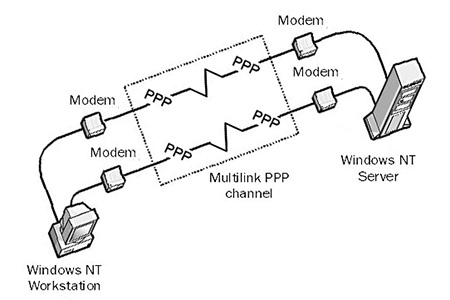 Operation and Maintenance
Operation and Maintenance
 Windows Operation and Maintenance
Windows Operation and Maintenance
 A simple comparison between SLIP and PPP
A simple comparison between SLIP and PPP
A simple comparison between SLIP and PPP
SLIP and PPP are both used to provide point-to-point serial communication between two hosts. What is the difference between them? The following article will give you a brief comparison between SLIP and PPP, so that you can briefly understand the difference between the SLIP protocol and the PPP protocol. I hope it will be helpful to you.

What is the SLIP protocol?
SLIP stands for Serial Line Internet Protocol and is a TCP/IP protocol, a simple Internet link protocol. It allows users to use a computer to get access to the Internet through a modem.
SLIP connections help the PC communicate with local Internet protocols and convert them to Internet hosts. It eliminates the need to connect PC users to a central computer with an Internet connection. Therefore, SLIP provides Internet services directly to personal computers.
What is the PPP agreement?
PPP stands for Point-to-Point Protocol and refers to a family of computer network protocols that provide a standard method of transmitting multi-protocol data over point-to-point links.

#PPP has become an Internet standard, helping to encapsulate and transmit datagrams over point-to-point serial links. A datagram is very similar to a data packet in a packet-switched network environment, but it does not depend on the physical network and does not contain the packet-switching node number and PSN destination port.
The main difference between SLIP and PPP

1. SLIP stands for Serial Line Internet protocol; whereas, PPP stands for Point-to-Point Protocol.
2. SLIP is an outdated protocol, although it is still used in some places; PPP is a new protocol used for the same purpose as SLIP, it has become an Internet standard and provides some new features .
3. IP protocol is the only protocol supported by SLIP. However, PPP supports multiple protocols.
4. PPP provides authentication, error detection, error correction, compression and encryption; SLIP does not have these functions.
5. In SLIP, IP addresses are statically assigned. However, PPP performs dynamic allocation.
6. Data can be transmitted in synchronous mode in SLIP. However, PPP facilitates both synchronous and asynchronous modes of data transmission.
How is PPP better than SLIP?
1. Multiplexing of network protocols
PPP can adapt to several other network technologies, not just limiting the Internet and TCP /IP.
2. Link configuration
It uses the negotiation mechanism to establish communication parameters between two PPP peers.
3. Error detection
At the receiving end, it discards damaged data packets.
4. Value-added communication features
It also supports data compression and encryption.
5. Establish a network address
Set the network address required for datagram routing.
6. Authentication
Before initiating communication, first authenticate the two end users.
The above is the entire content of this article, I hope it will be helpful to everyone's study. For more exciting content, you can pay attention to the relevant tutorial columns of the PHP Chinese website! ! !
The above is the detailed content of A simple comparison between SLIP and PPP. For more information, please follow other related articles on the PHP Chinese website!

Hot AI Tools

Undresser.AI Undress
AI-powered app for creating realistic nude photos

AI Clothes Remover
Online AI tool for removing clothes from photos.

Undress AI Tool
Undress images for free

Clothoff.io
AI clothes remover

AI Hentai Generator
Generate AI Hentai for free.

Hot Article

Hot Tools

Notepad++7.3.1
Easy-to-use and free code editor

SublimeText3 Chinese version
Chinese version, very easy to use

Zend Studio 13.0.1
Powerful PHP integrated development environment

Dreamweaver CS6
Visual web development tools

SublimeText3 Mac version
God-level code editing software (SublimeText3)

Hot Topics
 1377
1377
 52
52

